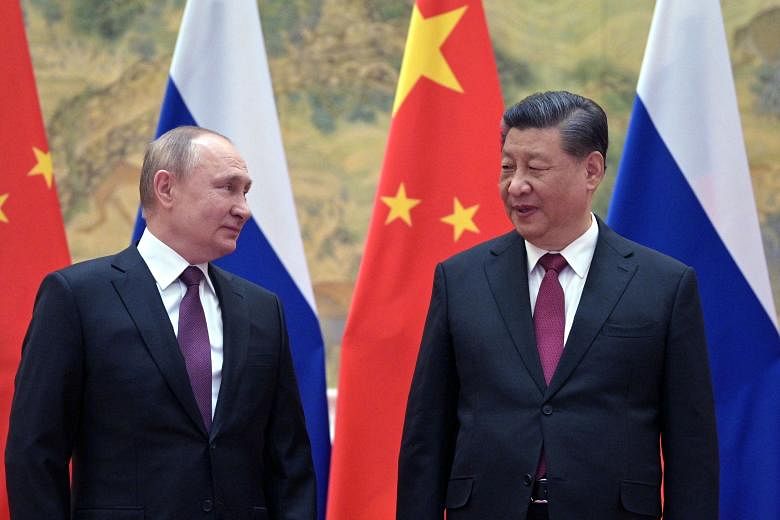ISLAMABAD (DAWN/ASIA NEWS NETWORK) - The summit between Xi Jinping and Vladimir Putin in Beijing on Friday (Feb 4) sends a strong message to the West that China and Russia are displaying strategic convergence on a number of key global issues.
In the backdrop of the brewing Ukraine crisis, as well as the West's boycott of the Beijing Winter Olympics over criticism of China's alleged human rights abuses, the significance of this meeting cannot be missed. Mr Putin was in China to attend the opening ceremony of the Games, which was boycotted by most Western leaders to spite China.
Without mincing words, Moscow and Beijing opposed the "further expansion of Nato" while calling on the "North Atlantic Alliance to abandon the ideological approaches of the Cold War". The eastern expansion of Nato is a key bone of contention between Russia and the US-led West, with Moscow drawing the line at Ukraine joining the grouping.
Russia has also expressed support for the 'One China' policy, with both sides stating that Taiwan is an "integral part of China". The two countries signed oil and gas deals worth over US$117 billion (S$157.5 billion) to strengthen the economic dimension of their relationship.
While the Cold War had witnessed the Sino-Soviet split, in the present times, their shared distrust of the US and EU is bringing China and Russia closer. The level of mistrust on both sides is immense, and any strategic miscalculation or brinkmanship can easily cause a flare-up with unsavoury geopolitical implications.
The Western bloc sees Russia and China as strategic, military and economic competitors, while Moscow and Beijing seek to assert themselves on the global stage. The fact is that Ukraine, as well as the tension over Taiwan, has the potential to spiral into a greater conflict, something that would lead to a fresh global arms race.
As has been observed, it is Nato's responsibility to assure Russia that the bloc does not seek to encircle it; further eastward expansion will only fuel greater hostility. As for China, the US appears to be rattled by its rapid economic growth. China is today the world's second biggest economy and could possibly unseat the US from the top slot some time down the road.
To avoid more tension, all sides need to keep competition within manageable limits, and the possibility of violent encounters must be off the table. The politics of forming spheres of influence is a dangerous one, and the world would benefit greatly from peaceful attempts to resolve disputes.
- The paper is a member of The Straits Times media partner Asia News Network, an alliance of 23 news media organisations.

